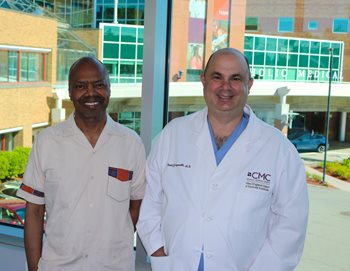There’s no way around it. Open-heart surgery is painful. In order to get to your heart, valves and arteries, the surgeon has to saw through your breastbone. The recovery process is long and often comes with a prescription for opioids to manage the pain.
N ow, imagine your surgeon offering you the option of open-heart surgery with little to no pain and possibly no opioids. Would you take it? Sixty-six year old Woullard Lett had to make that decision when planning for his surgery with Dr. David Caparrelli, a cardiac surgeon at CMC’s New England Heart & Vascular Institute. He would be the first patient in the Northeast to have this new technique and one of the first few in the world. “I’m an adventurous person but not necessarily a big risk taker,” Lett said.
ow, imagine your surgeon offering you the option of open-heart surgery with little to no pain and possibly no opioids. Would you take it? Sixty-six year old Woullard Lett had to make that decision when planning for his surgery with Dr. David Caparrelli, a cardiac surgeon at CMC’s New England Heart & Vascular Institute. He would be the first patient in the Northeast to have this new technique and one of the first few in the world. “I’m an adventurous person but not necessarily a big risk taker,” Lett said.
He decided to do it.
For most patients, the idea of having open-heart surgery without the use of opioids to manage pain sounds terrible. Dr. Caparrelli, however, is among a growing number of surgeons seeking an alternative to opioids to reduce the potential for patients to become addicted. His solution is to perform a nerve block that essentially freezes the nerve endings on the breastbone—or sternum—prior to surgery. It’s called cryo-analgesia and Dr. Caparrelli uses a device known as a CryoSPHERE probe from AtriCure to pinpoint the nerves that run from the sternum, under the ribs, to the spinal cord. Cryotherapy has been used for other types of surgical-associated pain for some time, but open-heart surgery is a new and ambitious application.
Lett’s biggest concern wasn’t the level of pain he’d experience from his cardiac surgery. Rather, he was worried he would push himself too far while recovering. “Pain is not punishment. It’s the body’s way of telling you something is wrong. So if I lose that benefit of having my body tell me it’s not ready to do something, I could hurt myself by overdoing it during my recovery.”
Dr. Caparrelli assured Lett that, if he followed the postoperative instructions, he would be fine. “Pain does not have to be part of surgical recovery,” Caparrelli explained. “Minimizing pain will enhance recovery.”
Lett received one dose of narcotic pain medication immediately following surgery and another pill the next morning. After that, he used nothing but Tylenol. He went home in four days, compared to the typical five-to-seven day hospital stay for an open-heart surgery.
Rebecca Morley, a nurse practitioner who works with Dr. Caparrelli, says there are other benefits to this approach. “Since beginning our pioneering work using cryo-analgesia in our open-heart patients, we have seen a dramatic reduction in postoperative pain. These patients have been able to get up and move around earlier, as well as cough and deep breathe better, which decreases the risk for pneumonia. We have also seen a substantial decrease in opioid use that further helps to decrease postoperative complications such as nausea and constipation.”
When Lett first got out of surgery, “My chest basically just felt numb, which was a strange feeling. I could tap my hand on my chest and feel nothing. Now that I’m approaching three months after the surgery and the nerves are growing back, I can feel my chest again.”
Dr. Caparrelli looks forward to more and more patients have the same experience. “We’ve now used this approach in 25 patients with the same results. In an era where there is so much focus on the opioid epidemic, pain control using this type of cryo-nerve block is an exceptional tool for preventing potential addiction. It is our belief that this represents the future of pain management for patients undergoing open-heart surgery.”
As published in the Union Leader on August 15, 2021